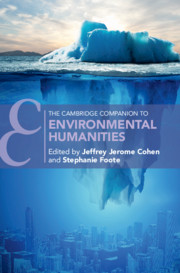Book contents
- The Cambridge Companion to Environmental Humanities
- The Cambridge Companion to Environmental Humanities
- Copyright page
- Contents
- Notes on Contributors
- Acknowledgments
- Chronology
- Chapter 1 Introduction: Climate Change/Changing Climates
- Chapter 2 The Commons
- Chapter 3 Rights
- Chapter 4 Time as Kinship
- Chapter 5 The Nature of Gender
- Chapter 6 Race, Health, and Environment
- Chapter 7 Narrative and Environmental Innovation
- Chapter 8 Climate Fictions: Future-Making Technologies
- Chapter 9 Apocalypse/Extinction
- Chapter 10 Multispecies
- Chapter 11 Food
- Chapter 12 Plants
- Chapter 13 Extraction
- Chapter 14 Ice/Water/Vapor
- Chapter 15 Rocks
- Chapter 16 Coal/Oil
- Chapter 17 Waste
- Chapter 18 Ecomedia
- Chapter 19 New Materialism and the Nonhuman Story
- Chapter 20 Risk
- Chapter 21 Coda: Virus
- Bibliography
- Index
- Cambridge Companions To Literature
- References
Chapter 11 - Food
Published online by Cambridge University Press: 12 August 2021
- The Cambridge Companion to Environmental Humanities
- The Cambridge Companion to Environmental Humanities
- Copyright page
- Contents
- Notes on Contributors
- Acknowledgments
- Chronology
- Chapter 1 Introduction: Climate Change/Changing Climates
- Chapter 2 The Commons
- Chapter 3 Rights
- Chapter 4 Time as Kinship
- Chapter 5 The Nature of Gender
- Chapter 6 Race, Health, and Environment
- Chapter 7 Narrative and Environmental Innovation
- Chapter 8 Climate Fictions: Future-Making Technologies
- Chapter 9 Apocalypse/Extinction
- Chapter 10 Multispecies
- Chapter 11 Food
- Chapter 12 Plants
- Chapter 13 Extraction
- Chapter 14 Ice/Water/Vapor
- Chapter 15 Rocks
- Chapter 16 Coal/Oil
- Chapter 17 Waste
- Chapter 18 Ecomedia
- Chapter 19 New Materialism and the Nonhuman Story
- Chapter 20 Risk
- Chapter 21 Coda: Virus
- Bibliography
- Index
- Cambridge Companions To Literature
- References
Summary
Approaching food systems today as a global pharmakon can help advance an Environmental Humanities response to the risks and unknowns of food. Whether it is the difficulty fish have in distinguishing microplastics from plankton, or the trouble humans who live in urban food deserts have finding fresh edibles, food in the early twenty-first century carries unprecedented threats of undernourishment, toxicity and death alongside its promise of life. Paradoxically, the ethics and politics emerging in response to the pharmakon of food may not always involve attempts to purify or certify it “free” of social and environmental ills. One alternative is to tell stories about “food-power” that highlight the agency of other species within a relational ontology that reveals human control, including efforts to control for food safety, to be a fiction. On their own, stories of food-power cannot confront the “power to devour” through which some humans assert their exceptionalism and domination. Gutsy struggles against food injustices by colonized and Indigenous people also show that food is neither an object nor a subject but a multispecies relationship protected through both story and action.
Keywords
- Type
- Chapter
- Information
- The Cambridge Companion to Environmental Humanities , pp. 141 - 155Publisher: Cambridge University PressPrint publication year: 2021

